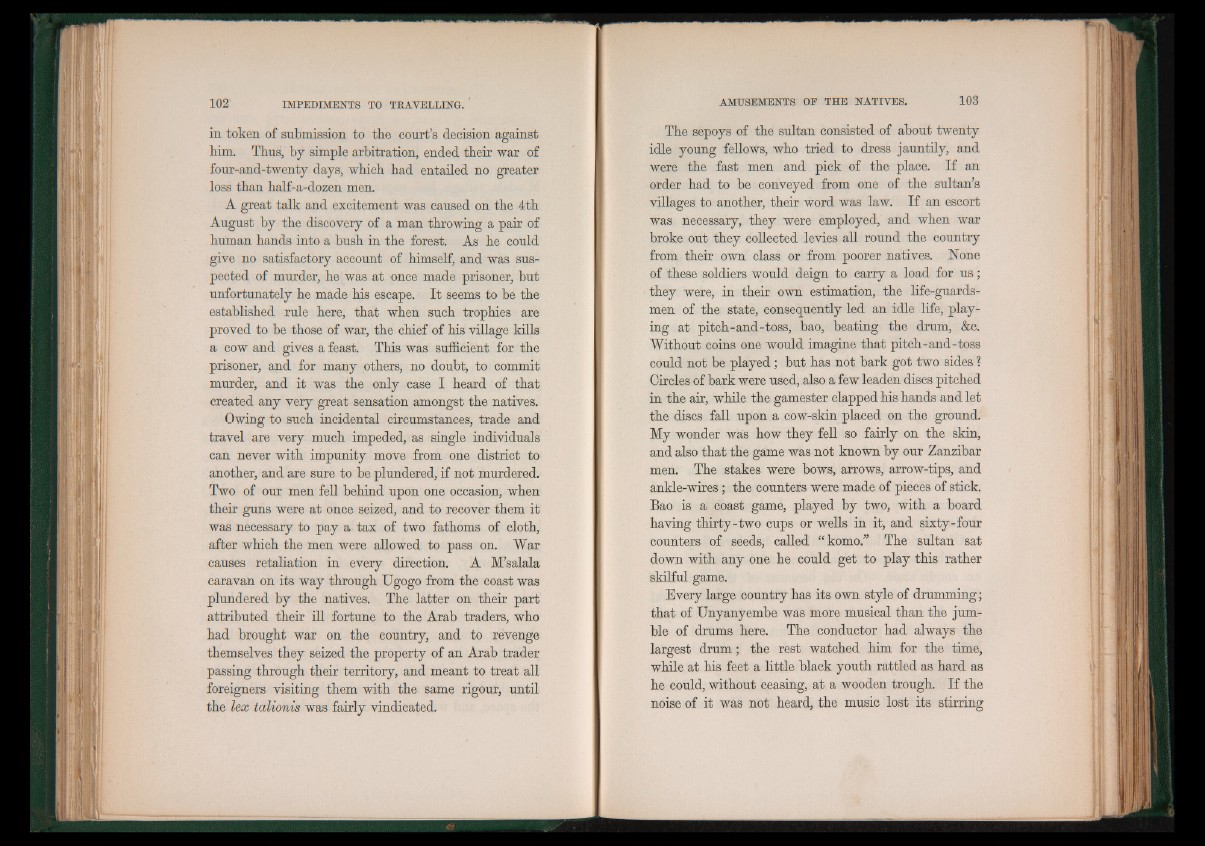
in token of submission to the court’s decision against
bim. Thus, by simple arbitration, ended their war of
four-and-twenty days, which had entailed no greater
loss than half-a-dozen men.
A great talk and excitement was caused on the 4th
August by the discovery of a man throwing a pair of
human hands into a bush in the forest. As he could
give no satisfactory account of himself, and was suspected
of murder, he was at once made prisoner, but
unfortunately he made his escape. It seems to be the
established rule here, that when such trophies are
proved to be those of war, the chief of his village kills
a cow and gives a feast. This was sufficient for the
prisoner, and for many others, no doubt, to commit
murder, and it was the only case I heard of that
created any very great sensation amongst the natives.
Owing to such incidental circumstances, trade and
travel are very much impeded, as single individuals
can never with impunity move from one district to
another, and are sure to be plundered, if not murdered.
Two of our men fell behind upon one occasion, when
their guns were at once seized, and to recover them it
was necessary to pay a tax of two fathoms of cloth,
after which the men were allowed to pass on. War
causes retaliation in every direction. A M’salala
caravan on its way through Ugogo from the coast was
plundered by the natives. The latter on their part
attributed their ill fortune to the Arab traders, who
had brought war on the country, and to revenge
themselves they seized the property of an Arab trader
passing through their territory, and meant to treat all
foreigners visiting them with the same rigour, until
the lex talionis was fairly vindicated.
The sepoys of the sultan consisted of about twenty
idle young fellows, who tried to dress jauntily, and
were the fast men and pick of the place. If an
order had to be conveyed from one of the sultan’s
villages to another, their word was law. If an escort
was necessary, they were employed, and when war
broke out they collected levies all round the country
from their own class or from poorer natives. None
of these soldiers would deign to carry a load for u s ;
they were, in their own estimation, the life-guards-
men of the state, consequently led an idle life, playing
at pitch-and-toss, bao, beating the drum, &c.
Without coins one would imagine that pitch-and-toss
could not be played; but has not bark got two sides ?
Circles of bark were used, also a few leaden discs pitched
in the air, while the gamester clapped his hands and let
the discs fall upon a cow-skin placed on the ground.
My wonder was how they fell so fairly on the skin,
and also that the game was not known by our Zanzibar
men. The stakes were bows, arrows, arrow-tips, and
ankle-wires; the counters were made of pieces of stick.
Bao is a coast game, played by two, with a board
having thirty-two cups or wells in it, and sixty-four
counters of seeds, called “ komo.” The sultan sat
down with any one he could get to play this rather
skilful game.
Every large country has its own style of drumming;
that of Unyanyembe was more musical than the jumble
of drums here. The conductor had always the
largest drum; the rest watched him for the time,
while at his feet a little black youth rattled as hard as
he could, without ceasing, at a wooden trough. If the
noise of it was not heard, the music lost its stirring